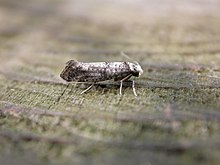| Paraswammerdamia lutarea | |
|---|---|

| |
|
Scientific classification
| |
| Domain: | Eukaryota |
| Kingdom: | Animalia |
| Phylum: | Arthropoda |
| Class: | Insecta |
| Order: | Lepidoptera |
| Family: | Yponomeutidae |
| Genus: | Paraswammerdamia |
| Species: | P. lutarea
|
| Binomial name | |
| Paraswammerdamia lutarea (
Haworth, 1828)
| |
| Synonyms | |
| |
Paraswammerdamia lutarea is a moth of the family Yponomeutidae. It is found in Europe.
The wingspan is 11–14 mm. The head is white, sometimes ochreous-tinged. Thorax fuscous, sometimes whitish-sprinkled. Forewings are fuscous-whitish, closely irrorated with dark fuscous; some longitudinal series of indistinct dark fuscous dots; a dark fuscous entire fascia before middle; a white costal spot before apex; cilia fuscous, with two darker lines. Hindwings are fuscous. The larva is deep brown; subdorsal line white, orange-spotted; spiracular white, on 5-1 2 orange-spotted above; head ochreous-brown, blackish-marked. [1]
Adults are on wing in July depending on the location.
The larvae feed on Crataegus, Sorbus aucuparia, Rosa and Cotoneaster horizontalis.
-
^ Meyrick, E., 1895 A Handbook of British Lepidoptera MacMillan, London
pdf
 This article incorporates text from this source, which is in the
public domain. Keys and description
This article incorporates text from this source, which is in the
public domain. Keys and description
| Paraswammerdamia lutarea | |
|---|---|

| |
|
Scientific classification
| |
| Domain: | Eukaryota |
| Kingdom: | Animalia |
| Phylum: | Arthropoda |
| Class: | Insecta |
| Order: | Lepidoptera |
| Family: | Yponomeutidae |
| Genus: | Paraswammerdamia |
| Species: | P. lutarea
|
| Binomial name | |
| Paraswammerdamia lutarea (
Haworth, 1828)
| |
| Synonyms | |
| |
Paraswammerdamia lutarea is a moth of the family Yponomeutidae. It is found in Europe.
The wingspan is 11–14 mm. The head is white, sometimes ochreous-tinged. Thorax fuscous, sometimes whitish-sprinkled. Forewings are fuscous-whitish, closely irrorated with dark fuscous; some longitudinal series of indistinct dark fuscous dots; a dark fuscous entire fascia before middle; a white costal spot before apex; cilia fuscous, with two darker lines. Hindwings are fuscous. The larva is deep brown; subdorsal line white, orange-spotted; spiracular white, on 5-1 2 orange-spotted above; head ochreous-brown, blackish-marked. [1]
Adults are on wing in July depending on the location.
The larvae feed on Crataegus, Sorbus aucuparia, Rosa and Cotoneaster horizontalis.
-
^ Meyrick, E., 1895 A Handbook of British Lepidoptera MacMillan, London
pdf
 This article incorporates text from this source, which is in the
public domain. Keys and description
This article incorporates text from this source, which is in the
public domain. Keys and description